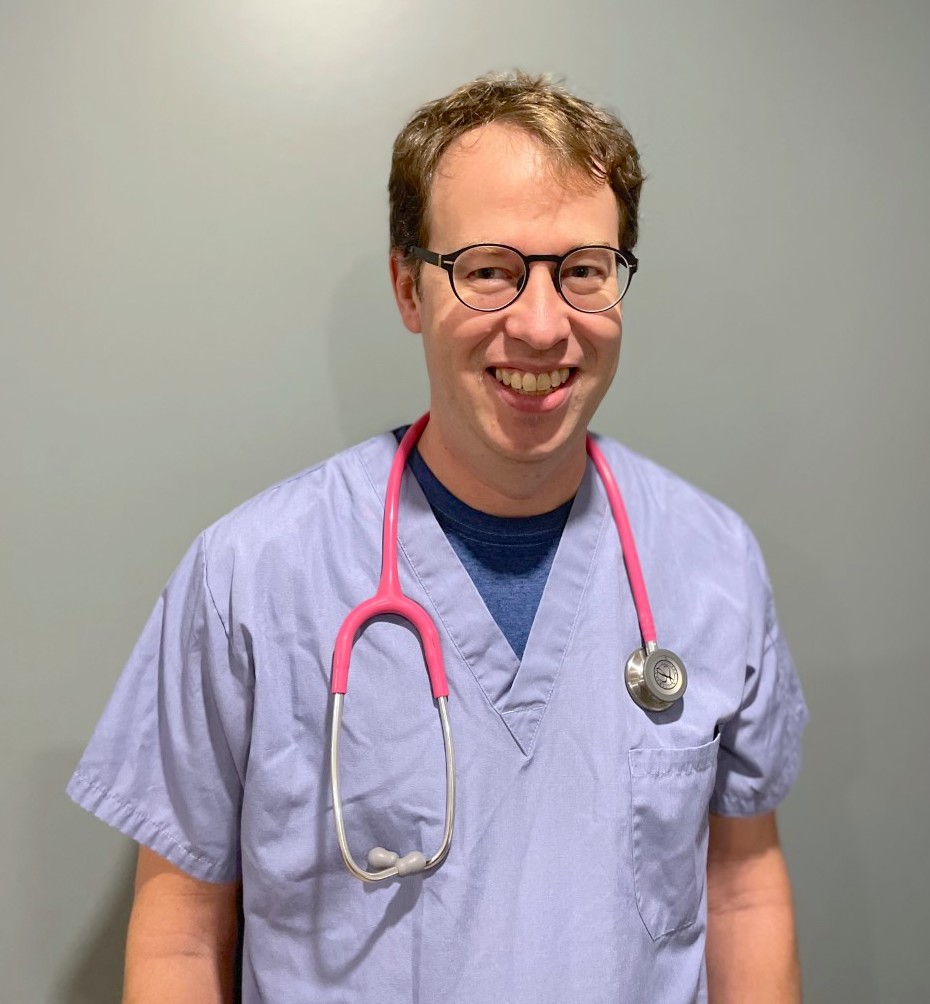Owen Averill
Family Physician
Bachelor of Arts (Hons), 2004
A lot of what I was exposed to at King’s became the foundation of the ethical thinking I use as a doctor, from patient’s rights to resource stewardship. King’s gave me a framework for those things.
The path to medical school looks to be pretty straightforward; head down, work hard, prescribed courses and an undergraduate degree in the sciences. Not surprisingly, King’s graduate Owen Averill found another route although, admittedly, he wasn’t focused on medicine when he arrived at King’s to do the Foundation Year Program in 2000.
“I believed in education for education’s sake and that the logistics of life would figure themselves out,” Averill, now a family physician in New Glasgow, N.S., explains. He was drawn to King’s as a small liberal arts college and to FYP because he loved to read. “I had been a maths and sciences guy in high school and I wanted some new experiences. FYP showed me that the last two hundred years are what most interested me, hence my humanities degree in Contemporary Studies and Economics. In a way, med school was a process of deduction, a differential diagnosis as to what career I wanted. So, my thinking and way in wasn’t typical, I guess, but it was a great decision. I love what I do.”
After medical school at the University of Ottawa, another twist; Averill headed for Whitehorse, Yukon. “I did a residency in family medicine and trained to be an urban, academic family doctor, but I wanted to go somewhere rural and remote and have that kind of experience before settling in.”
With wife (Heidi Laing, BA(Hons)’04) and baby onboard, Averill went north where Whitehorse brought him opportunities to explore the widest possible range of his skills along with the outdoor adventures—canoeing, camping, cycling and wildlife—he loves.
He had a small outlying community practice outside Whitehorse, and he took care of patients in hospital, as well as nursing homes and long-term care. “I was the country doctor generalist doing a bit of everything and that really appealed to me,” he enthuses. “I loved the challenge of being the one who was responsible and having to stretch my limits. Your scope can narrow over time, and it has always been my goal to continue to expand.” His work and passion for the outdoors kept him and his family in Whitehorse; their year in the Yukon slowly stretched to nine and a half.
Now with three children, a growing desire to be near family—Laing’s parents live in Halifax— brought them to Nova Scotia. King’s classmates from Pictou County encouraged them to consider New Glasgow. “A part of me wanted to come back to Nova Scotia and having become a rural generalist, I wanted to be in a smaller place.”
Averill joined a forward-thinking collaborative care practice and soon he’ll be back working in his hospital’s emergency ward and doing inpatient care. “I like having a role where I’m visible and accountable to the community. Being a physician is a lot more fulfilling when you can see that you are contributing that way.”
As for his rich educational background in the humanities, Averill says it is at the core of his approach to medicine. “A lot of what I was exposed to at King’s became the foundation of the ethical thinking I use as a doctor, from patient’s rights to resource stewardship. King’s gave me a framework for those things.”
At the micro level, he explains, it plays out by informing what he stands for, who gets care and the kind of care they get, who gets access to resources and how they are shared and used. “In Whitehorse I was very involved in medical politics at both the hospital and territorial level,” he adds. “My background informed my thoughts. I can definitely trace them back to what I learned in my courses at King’s.”
Still passionate about his chosen field, Averill speaks about being a family doctor with reverence. “I love the chase and thrill of solving a mystery in diagnosis and the satisfaction of successfully treating something. It’s wonderful to be part of a very privileged community of physicians in that we get access to people’s lives in a way that no one else does. This work gives you a vision into how the world is so different for so many people and I find that fascinating…to be a part of a community, contributing to it, responsible to it. I love that feeling of responsibility. It’s incredibly rewarding.”
